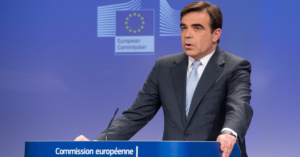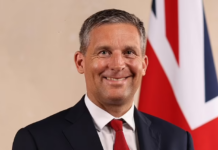When Theresa May visits Brussels on Friday, EU negotiators will be listening intently for signs the British prime minister is preparing to risk a domestic backlash and raise her offer to secure a Brexit deal in December.

European Union officials and diplomats from the other 27 member states involved in the process hope that within a week to 10 days of meeting European Council President Donald Tusk, during a summit with ex-Soviet neighbours, May will deliver movement on three key conditions so that her EU peers can launch a new phase of Brexit negotiations when they meet on Dec. 14-15.
“I don’t know what room for manoeuvre May has, but what we can see is a willingness to act,” one senior EU official told Reuters. Another spoke of efforts to arrange the “choreography” of a deal over the next three weeks, including an EU-UK “joint report” pinning down interim accords to unlock talks on trade.
“I feel the tectonic plates moving now,” a diplomat handling Brexit for an EU government said. “Time is running out and a failure in the December Council would serve nobody’s purpose.”
There has been only a day of top-level talks between the two lead negotiators since a mid-October summit that dismissed May’s call for immediate talks on a future trade agreement.
But talks are continuing apace behind the scenes, ahead of a deadline of early December to strike a deal which can then be formalised by the 27 government leaders at the summit.
“Everyone is talking to everyone already, at all levels,” the European Commission’s chief spokesman Margaritis Schinas told reporters on Thursday when he confirmed that May would meet Commission President Jean-Claude Juncker and Brexit negotiator Michel Barnier in Brussels on Monday, Dec. 4.
That is two days before envoys from the 27 meet on Dec. 6 to discuss a first draft of the Dec. 14-15 summit conclusions, including, crucially, whether the leaders should accept Britain has made “sufficient progress” to merit opening trade talks.
Hopes in Brussels have been raised by reports in British media that May has secured backing from pro-Brexit hardliners in her cabinet to increase the amount of a financial settlement of what Britain owes to the Union when it leaves in March 2019.
“If there is a political willingness in Britain, we should be ready,” a senior EU official said, while warning that nothing was being taken for granted.
May’s room for manoeuvre to cut a deal that would please business while irritating Britons who want a sharper break with Brussels is limited. And Germany and France, the Union’s lead powers, have taken a tough line so far.
With German Chancellor Angela Merkel distracted at home by a search for a new coalition, May can expect little focus from her to help smooth a deal, several diplomats said.
Some in Britain have suggested May could take advantage of Merkel’s weakness at home to drive a harder bargain. But EU diplomats argue that Merkel’s troubles make it harder for her, and so for the 27, to water down their existing demands. So any brinkmanship around the summit could mean no deal in December.
“That would create some kind of crisis in negotiations,” the second EU official said, noting that time was already short to complete a treaty by late next year to ensure an orderly Brexit.
“But maybe that is necessary.”
The sides already believe they are quite close on agreeing the scope of rights for expatriate citizens in Britain and on the continent, though the EU will be particularly looking to pin Britain down to accepting its demands that any agreement be subject to enforcement through the Union’s legal system.
The third key criterion for moving to Phase Two, an outline agreement on how to avoid the new EU-UK land border disrupting the peace in Northern Ireland, remains a potential stumbling block. Differences of opinion between London and Dublin have been marked this month, worrying EU officials.
However, it is the financial settlement that has been the most concerning for the past few months. Officials believe that could be resolved by a combination of May stating clearly that Britain will pay a share after leaving of two major EU budget lines, staff pensions and agreed but undisbursed spending.
British press reports, seen in Brussels as planted leaks from May, suggesting she might offer to pay something like 40 billion pounds ($53 billion) have encouraged EU negotiators.
While that is well short of the 60 billion euros ($71 billion) the European Commission has mentioned, that was always seen by EU officials as a maximum demand. And they are willing, they say, to help May massage the public messaging of the amount in order to limit the political flak she takes at home.
“On presentational issues, Barnier is ready to help, not to call things by their real name,” an EU official said.
Kindly follow us on twitter:@AfricanVoice2









